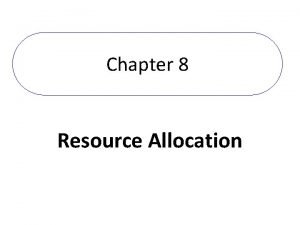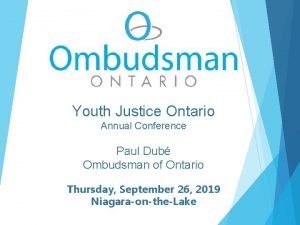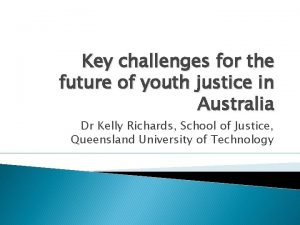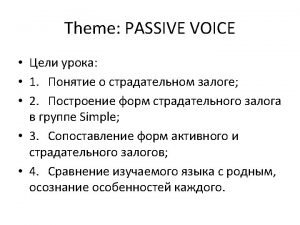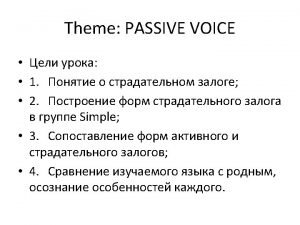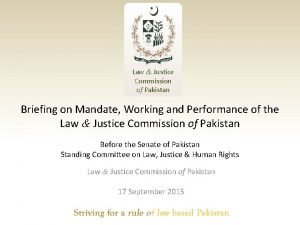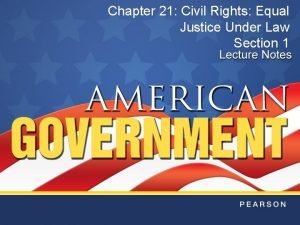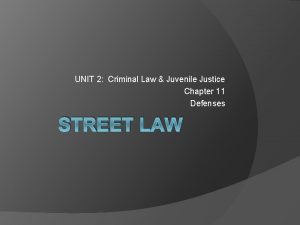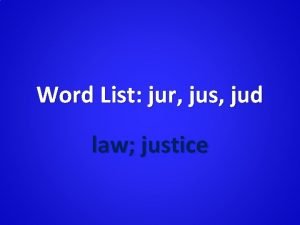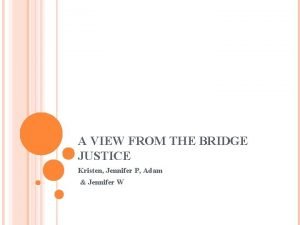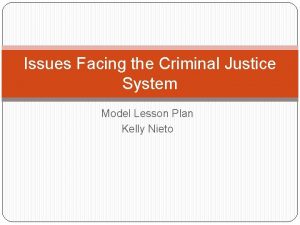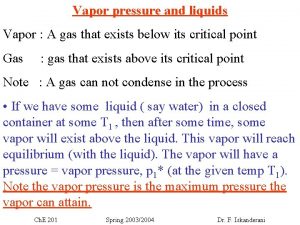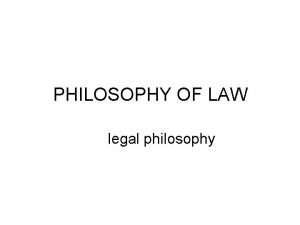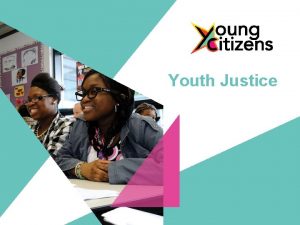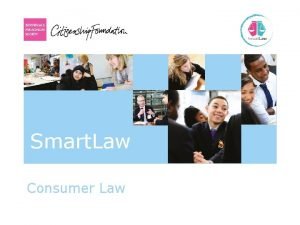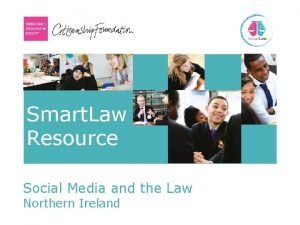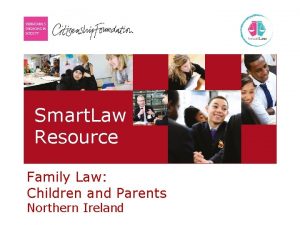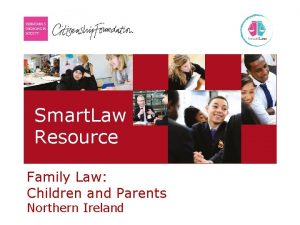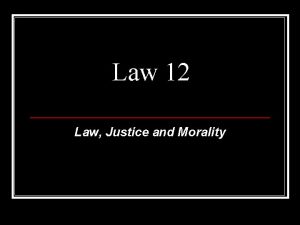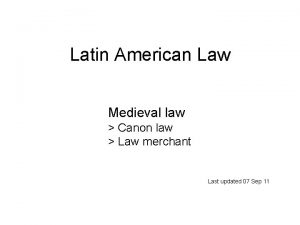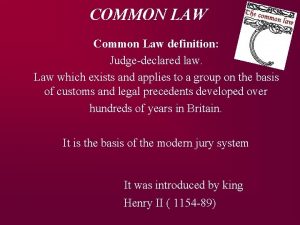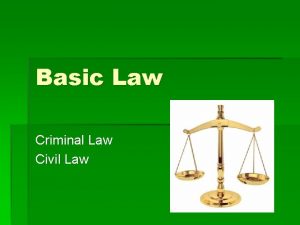Smart Law Resource Youth Justice Youth Justice Lesson


























- Slides: 26

Smart. Law Resource Youth Justice ●

Youth Justice Lesson Objectives • Share your thoughts about justice • Understand your rights within the criminal justice system • Understand why we punish criminals • Be able to discuss different types of punishment and their advantages and disadvantages © Citizenship Foundation 2016 • Charity Reg. No. 801360

Youth Justice What should the justice system look like? sen po t urts co crime que lice tenc s arre ing Use the sheet to think about the justice system you would like to see. stion ing fair ness © Citizenship Foundation 2016 • Charity Reg. No. 801360 punis hmen t trials e y t i l a qu

Youth Justice From the Police Station to the Court Complete the quiz in pairs to test your existing knowledge of the criminal justice system. © Citizenship Foundation 2016 • Charity Reg. No. 801360

Youth Justice What the law says… Can you be arrested for a criminal offence if you are under 14? Yes No Only in serious cases Children aged 10 and over are responsible for any crimes they commit and can be arrested and charged with a crime. If a child is under 10, other punishments can be given for illegal actions. © Citizenship Foundation 2016 • Charity Reg. No. 801360

Youth Justice What the law says… Is a young person entitled to a solicitor when interviewed at a police station at any age? Yes No Only in serious cases The duty solicitor is available 24 hours a day and is not employed by the police. This is free of charge. If you are under 16, an appropriate adult needs to be present during questioning and searching in addition to a solicitor, e. g. a parent, social worker, family member over 18 or volunteer. © Citizenship Foundation 2016 • Charity Reg. No. 801360

Youth Justice What the law says… Do the police have to caution all suspects at the start of an interview? Yes No Only in serious cases What is a caution? A caution is a warning that anything that a suspect says may be used as evidence in court. © Citizenship Foundation 2016 • Charity Reg. No. 801360

Youth Justice What the law says… Can a young person (under 18) be forced to give fingerprints? Yes No Only in serious cases Yes, the police have powers to take fingerprints without consent from any person over the age of 10. © Citizenship Foundation 2016 • Charity Reg. No. 801360

Youth Justice What the law says… For how long can a suspect normally be held at a police station without charge? Up to 24 hours Up to 2 days Up to 4 days Suspects cannot generally be held for more than 24 hours without being charged or released. If a serious offence is being investigated, a senior police officer can authorise detention for a further 12 hours. This can be extended to 96 hours with a magistrate’s approval. A terrorism suspect can be held for 14 days without charge. © Citizenship Foundation 2016 • Charity Reg. No. 801360

Youth Justice What the law says… Can a young person be kept in a police cell? Yes No Only in serious cases Only as a last resort if no other secure, supervised accommodation is available. A young person cannot be placed in a cell with an adult who is also under detention. © Citizenship Foundation 2016 • Charity Reg. No. 801360

Youth Justice What the law says… Does a young person who is arrested have to pay for legal help and advice? Yes No Only for serious offences A consultation with a duty solicitor is free and conducted in private. For some less serious offences this consultation is done by telephone. © Citizenship Foundation 2016 • Charity Reg. No. 801360

Youth Justice What the law says… Up to what age will a young person usually be interviewed by the police with one of their parents present? 14 17 19 A suspect under 17 is normally interviewed with a parent or appropriate adult, unless a delay would mean an immediate risk of harm to someone or serious loss of or damage to property. © Citizenship Foundation 2016 • Charity Reg. No. 801360

Youth Justice What the law says… Does a person who is arrested have to answer a police officer’s questions? Yes No Only in serious cases A person must give the police their name and address, but then has the right to remain silent and not answer any further questions. However, if the case goes to trial the court will be told of this and it may strengthen the case against the suspect. © Citizenship Foundation 2016 • Charity Reg. No. 801360

Youth Justice What the law says… Until what age are young people tried in a Youth Court? 17 19 21 Cases where the accused is aged up to and including 17 are generally heard in a youth court. However, a young person charged alongside an adult will be sent for trial at the magistrates’ court. In exceptional cases, such as when a young person is charged with murder, the trial will be held in a crown court. © Citizenship Foundation 2016 • Charity Reg. No. 801360

Youth Justice Why do we punish people who commit crimes? ciety? o s t c e t o r To provide justice to victims and their families? To remo ve poten tia lly dang erous e action? t n a il ig v t n To preve ? To prevent crime people? To rehabilitate criminals? Are all of your reasons equally important? If not, which one of your reasons is the most important? © Citizenship Foundation 2016 • Charity Reg. No. 801360

Youth Justice From Crime to Punishment We are going to look at the different stages that someone suspected of committing a crime might go through © Citizenship Foundation 2016 • Charity Reg. No. 801360

Youth Justice From Crime to Punishment It’s 11 pm. The police receive a call telling them that a young boy wearing a dark hoodie, jeans and trainers has been spray painting graffiti on a bus shelter. Is graffiti a crime? Yes Graffiti is criminal damage (damaging/destroying property belonging to another) even if artistically done. How should the police respond to the call? Question people in the area matching the description and search them if they are suspicious © Citizenship Foundation 2016 • Charity Reg. No. 801360

Youth Justice From Crime to Punishment The police drive around and spot a boy matching the description. They search him and find paint on his hands and a large spray can hidden under his jumper. The boy says his name is Adam. He is 13 years old. Should the police…. Call Adam’s Parents to come and pick him up Arrest him and take him into the police station for questioning Take him home and question him with his parents present © Citizenship Foundation 2016 • Charity Reg. No. 801360 Children over ten can be charged with committing a criminal offence.

Youth Justice From Crime to Punishment The police take Adam to the police station. Who else should be present during the interview? Adam’s parents and his class teacher Adam’s parents, or his class teacher, or a volunteer appropriate adult if his parents can’t come, and the duty solicitor Adam’s class teacher and the duty solicitor © Citizenship Foundation 2016 • Charity Reg. No. 801360 The interview will be tape-recorded. Why do you think this is important? The police might also photograph Adam and take his fingerprints at the station.

Youth Justice From Crime to Punishment Adam admits to the graffiti, but doesn’t say why he did it. The cost of repairing the bus shelter is £ 2, 000. What will happen next? Adam will be let off with a warning Adam will be charged with criminal damage and bailed (given freedom) until he has to appear in court Adam will be fined for the damage caused © Citizenship Foundation 2016 • Charity Reg. No. 801360 Do you think this case is serious enough to go to court? Why/why not? What bail conditions do you think might be set? Why would these be imposed?

Youth Justice From Crime to Punishment A couple of weeks later Adam appears in the Youth Court. This is his first offence. He pleads guilty and the magistrates decide to sentence him straight away. Will it make a difference to Adam’s sentence that he pleaded guilty? Yes No Only if he tells the court why he grafitied the shelter © Citizenship Foundation 2016 • Charity Reg. No. 801360 You can get up to a one -third reduction on your sentence by pleading guilty at the first opportunity.

Youth Justice From Crime to Punishment What is the most likely sentence Adam will receive? A short time in prison/Youth Offenders Institution A fine for the damage caused A referral order © Citizenship Foundation 2016 • Charity Reg. No. 801360 This means he’ll be ‘referred’ to a Youth Panel of three adults, who, with Adam and his parents, will agree on a programme lasting 3 -12 months designed to reduce the chances of him re-offending. Adam’s parents may also have to contribute towards repairing the bus shelter.

Youth Justice From Crime to Punishment Adam and his parents meet with the Youth Panel and someone from the local bus company. Together, they all draw up a contract agreeing that Adam will do certain things designed to prevent him offending in the same way again. What things might this contract include? How effective do you think each of these will be? Why? • Writing a letter of apology to the bus company • Carrying out some practical work for the bus company or local community • Creating a poster to show others the effects of vandalism • Agreeing to stay away from certain places or people. © Citizenship Foundation 2016 • Charity Reg. No. 801360

Youth Justice What is the best way to punish criminals? Advantages Fast and cheap for taxpayers Fines Community Sentences Criminal Behaviour Orders/Crime Prevention Injunctions Custodial Sentences (Prisons) The community will benefit, cheaper than prison, gives time to reflect on crime - rehabilitative Aims to tackle the reasons behind individual’s crime Serious deterrent, gives time to think about crime, is rehabilitative and removes dangerous people from society. What are the disadvantages of each form of punishment? © Citizenship Foundation 2016 • Charity Reg. No. 801360

Youth Justice Punishment Read Danny Merchant’s Case, and then read your character card. Success Criteria: • Use persuasive language Put yourself in your character’s shoes. You must write a speech to persuade the court to make a decision about Danny which is in your best interest. © Citizenship Foundation 2016 • Charity Reg. No. 801360 • Use facts about Danny in your speech • Use the character cards to help you write your speech

Youth Justice Plenary • What have you most agreed or disagreed with in this lesson? • Do you think young people are aware of the processes involved when someone commits a crime? • Have any of your thoughts about the justice system changed? • Do you think that it is important to punish someone that has offended? Why/why not? • Do you think Britain should have the death penalty? Why or why not? Tweet us your most important piece of advice for young people! @Smart. Law. CF using the hashtag #Smart. Law or leave a comment on our Facebook page, Smart. Law – Citizenship Foundation © Citizenship Foundation 2016 • Charity Reg. No. 801360
 Resource loading vs resource leveling
Resource loading vs resource leveling Contoh resource loading
Contoh resource loading Newton's first law and second law and third law
Newton's first law and second law and third law Newton's first law
Newton's first law Boyles law
Boyles law Avogadro's law constant
Avogadro's law constant Youth justice ontario
Youth justice ontario Youth justice quotes
Youth justice quotes 8-6 practice the law of sines and law of cosines
8-6 practice the law of sines and law of cosines Book smart vs street smart
Book smart vs street smart One smart man he felt smart
One smart man he felt smart It is not how smart you are it's how you are smart
It is not how smart you are it's how you are smart Jeopardy smart
Jeopardy smart Eight types of intelligence
Eight types of intelligence Kim ung yong
Kim ung yong Street smart vs book smart quotes
Street smart vs book smart quotes One smart man he felt smart
One smart man he felt smart Law and justice commission of pakistan
Law and justice commission of pakistan Chapter 21 civil rights equal justice under law
Chapter 21 civil rights equal justice under law Chapter 11 basic concepts street law
Chapter 11 basic concepts street law What do the roots jur jus and jud mean
What do the roots jur jus and jud mean A view from the bridge law and justice
A view from the bridge law and justice Eighth amendment excessive bail
Eighth amendment excessive bail Raoult's law and dalton's law
Raoult's law and dalton's law What is a civil law
What is a civil law Positive law vs natural law
Positive law vs natural law Natural law vs positive law
Natural law vs positive law
